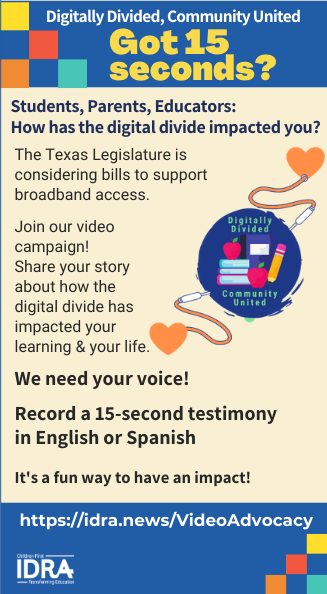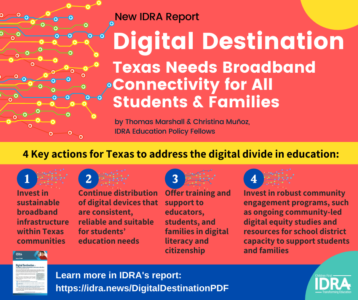• Thomas Marshall • IDRA Newsletter • April 2021 •
 The digital divide affects millions of Texas households that cannot get broadband Internet access. As schools moved activities to virtual platforms due to the COVID-19 pandemic, many families faced even more barriers to communicating with teachers and school leaders.
The digital divide affects millions of Texas households that cannot get broadband Internet access. As schools moved activities to virtual platforms due to the COVID-19 pandemic, many families faced even more barriers to communicating with teachers and school leaders.
About 200 parents, caregivers and students across Texas recounted to IDRA their experiences with these problems through:
- weekly advocacy training sessions,
- weekly virtual office hours,
- stakeholder webinar discussions,
- our statewide student summit and follow up meetings, and
- our digital divide video campaign.
For example, Alma Muñiz, a parent who lives in the Rio Grande Valley of Texas, described her daughter’s connectivity issues and her problems trying to engage with the school: “There are multiple times when the Internet fails because we don’t have very good Internet service where we live. I often have to speak to the school so that they do not mark her absent, and I have to explain to them that the Internet at home is not very good.”
 Soon after schools closed in March 2020, IDRA launched a partnership with two community-based organizations in the Texas Rio Grande Valley to help Spanish-speaking families navigate virtual classrooms. Mentors from the College Scholarship Leadership Access Program (CSLAP) provide tech support to members of ARISE, a grassroots organization that promotes empowerment through education and part of IDRA’s Education CAFE network.
Soon after schools closed in March 2020, IDRA launched a partnership with two community-based organizations in the Texas Rio Grande Valley to help Spanish-speaking families navigate virtual classrooms. Mentors from the College Scholarship Leadership Access Program (CSLAP) provide tech support to members of ARISE, a grassroots organization that promotes empowerment through education and part of IDRA’s Education CAFE network.
Solving the digital divide comes down to access, affordability and digital literacy. Without access to devices, families cannot check-in on students’ learning progress and needs. Without an affordable, dependable Internet connection, families cannot make sure each child can participate in online classes. And without proper digital literacy training, families cannot use technology to its fullest potential, which hinders family-school interaction and student engagement.
IDRA released a report this month, Digital Destination – Texas Needs Broadband Connectivity for All Students & Families, on the digital divide’s effects on Texas students and families and what Texas should do to secure equitable access to broadband for Texas’ most vulnerable student populations.
At the same time, IDRA launched a video campaign, Digitally Divided – Community United, to promote digital equity and highlight community voices about how the digital divide has impacted learning and daily life for them (see box). The campaign is led by IDRA, Lit Communities, the Digital Inclusion Alliance of San Antonio, and the Texas Legislative Education Equity Coalition (TLEEC).
The Texas Legislature has seen a number of proposals to help fix the connectivity and engagement issues. House Bill 5 and Senate Bill 5 both aim to create permanent broadband infrastructure and include steps to identify public schools that do not have access to the Internet. And since the digital divide is not limited to rural areas, House Bill 5 specifically would add an urban school district representative to the Governor’s Broadband Development Council, which currently has no such representation.
Rep. James Talarico worked with IDRA to file HB 4391 to require school districts to create student and family engagement plans so schools can make sure student and family voices are at the forefront of major education decisions. This is especially urgent as schools plan how to operate during the pandemic, how to address the digital divide, and what steps to take to make up for instruction disruptions over the past two school years. Also, Rep. Mary Gonzalez filed HB 129 that would create a digital citizenship course to help students engage in the digital world.
IDRA Bridges the Digital Divide with Family Advocacy
 While connectivity is critical to schools engaging with families, family engagement must inform solving the digital divide. Over the years, IDRA has developed a family leadership model that engages families and community members in their school policies and practices through the Education CAFE model. That work continues during the current Texas legislative session.
While connectivity is critical to schools engaging with families, family engagement must inform solving the digital divide. Over the years, IDRA has developed a family leadership model that engages families and community members in their school policies and practices through the Education CAFE model. That work continues during the current Texas legislative session.
For example, every Monday afternoon, IDRA holds “office hours” to help students, families, educators and community members submit their own comments on education bills being debated by Texas lawmakers that week.
We also have been engaging with families in the Rio Grande Valley through weekly virtual meetings and training sessions about how the legislative process works during a pandemic and to support family members as they prepare comments to submit about proposed legislation (see story on Page 3).
Similarly, IDRA is facilitating FANBi (Familias Abogando por Niños Bilingües) to empower families of young emergent bilingual (English learner) students to participate in the legislative process. Through workshops, town halls and advocacy nights, FANBi families advocate for high-quality bilingual education programs. FANBi is part of the Texas Early Childhood English Learner Initiative led by IDRA; Texans Care for Children; Philanthropy Advocates; Dr. Dina Castro, UNT Denton; and the Texas Association for the Education of Young Children (TxAEYC).
IDRA also led several initiatives to elevate student voices, such as our Texas Student Advocacy Convening, a virtual summit for students to hear the results of a student-led survey about their experiences with school during the pandemic, discuss major policy issues the legislature is considering and issues they think policymakers should consider, and plan next steps for elevating student voices at the capitol.
Creating an effective broadband infrastructure for the state of Texas depends on robust student and family engagement at all levels. We must help create sustainable fixes to the digital divide, because without them, we will struggle throughout the COVID-19 pandemic and beyond.
Resources
Marshall, T. (February 2021). Texas Needs an Equitable State Broadband Plan to Serve Students and Families. IDRA Newsletter.
Marshall, T., & Muñoz, C. (April 20, 2021). Digital Destination – Texas Needs Broadband Connectivity for All Students & Families. San Antonio: Intercultural Development Research Association.
Wilson, T. (August 2020). Effective Education Reform During COVID-19 Requires Authentic Family Engagement. IDRA Newsletter.
Wilson, T. (June 26, 2020). Family Engagement is Key to Student Safety Amidst COVID-19 Reopening. Learning Goes On.
Thomas Marshall is an IDRA Education Policy Fellow. Comments and questions may be directed to him via e-mail at thomas.marshall@idra.org.
[©2021, IDRA. This article originally appeared in the April 2021 IDRA Newsletter by the Intercultural Development Research Association. Permission to reproduce this article is granted provided the article is reprinted in its entirety and proper credit is given to IDRA and the author.]



